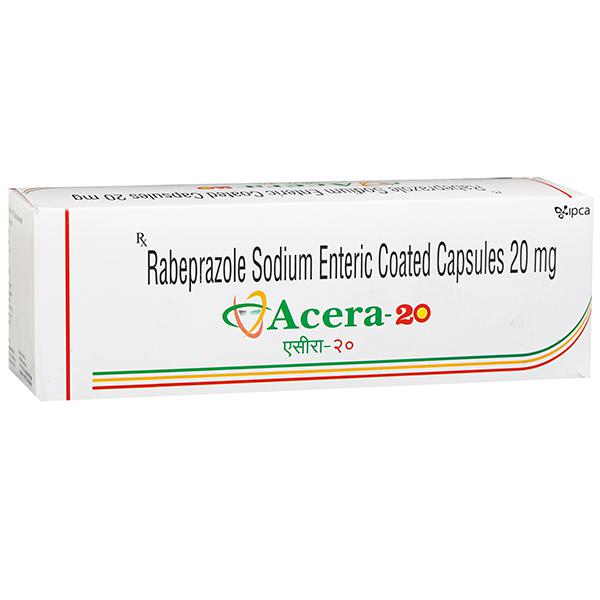Product Introduction:
Rabeprazole is a proton pump inhibitor (PPI) that reduces the amount of acid produced in the stomach. It is commonly used to treat conditions such as gastroesophageal reflux disease (GERD), peptic ulcers, and other conditions associated with excess stomach acid.
Acera 20MG Capsules medicine should be taken one hour before a meal, preferably in the morning. The dose will depend on your underlying condition and how you respond to the medicine. Try to take it regularly at the same time each day as advised by your doctor. You should keep on taking it as prescribed even if your symptoms disappear quickly. You may be able to help improve your symptoms by eating smaller meals more often and avoiding caffeinated drinks like tea and coffee, and spicy or fatty foods.
This medicine’s most common side effects include nausea, vomiting, headache, dizziness, flatulence, diarrhea, and stomach pain. These tend to be mild but talk to your doctor if they bother you or do not go away. The risk of side effects may increase the longer you take this medicine. Long-term use (more than 1 year) may increase your risk for bone fractures, especially with higher doses. Talk to your doctor about ways to prevent bone loss (osteoporosis), like taking calcium and vitamin D supplements.
Low blood magnesium levels (hypomagnesemia) have been seen in some people taking this medicine for 3 months or more. This may lead to tiredness, confusion, dizziness, muscle twitches, and an irregular heartbeat. Your doctor may monitor your magnesium levels to prevent this.
Acera 20MG Capsules is not suitable for some people. Before taking this medicine, you need to tell your doctor if you have severe liver problems, are taking medicines for HIV, have ever had an allergic reaction to similar medicines in the past, or suffer from bone loss (osteoporosis). Pregnant or breastfeeding women should also consult their doctor before taking it. Avoid drinking alcohol as it makes your stomach produce excessive acid and can worsen your symptoms. Do not drive or use machinery or tools, if this medicine makes you feel dizzy or sleepy.
Benefits:
- Acid Reduction: Rabeprazole helps in reducing the production of stomach acid, providing relief from symptoms such as heartburn and acid reflux.
- Healing Ulcers: It can aid in the healing of peptic ulcers by reducing the acidity in the stomach.
Side Effects:
While many people tolerate Rabeprazole well, some individuals may experience side effects, including:
- Headache
- Nausea
- Diarrhea
- Abdominal pain
- Flatulence
- Dizziness
It’s important to contact a healthcare professional if you experience severe or persistent side effects.
Usage Guidelines:
- Take the medication exactly as prescribed by your healthcare provider.
- Swallow the capsule whole with a glass of water, usually before a meal.
- Do not crush or chew the capsule, as it is designed to release the medication slowly.
Drug Interactions:
Rabeprazole may interact with other medications. Inform your healthcare provider about all the drugs you are taking, including prescription, over-the-counter, vitamins, and herbal supplements. Some medications that may interact with Rabeprazole include certain antifungals, HIV protease inhibitors, and drugs that require an acidic stomach for absorption.
Precautions:
- Inform your doctor about any allergies or medical conditions you have.
- Let your healthcare provider know if you are pregnant, planning to become pregnant, or breastfeeding.
Always follow the specific guidelines provided by your healthcare provider or the product packaging, and consult with a healthcare professional for accurate and personalized information regarding the medication you are using.
SAFETY ADVICE

Alcohol

Pregnancy

Breast feeding

Driving

Kidney

Liver
| Weight | 0.5 kg |
|---|---|
| Dimensions | 10 × 10 × 10 cm |


